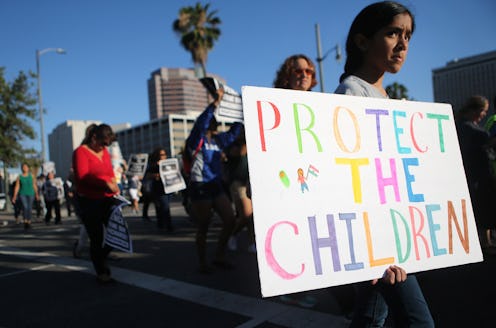News
What We Know Happens To Migrant Kids After They're Torn From Their Parents

It's bad enough that thousands of migrant children and parents have been separated from each other — but now, no single government entity appears to know where they'll end up. What happened to migrant kids who've been separated from their parents is a confusing mess that NGOs have largely been forced to sort out. It involves several stages of processing, and often a trip across the country, far away from where their parents are being held.
In April, the Trump administration began a "zero-tolerance" policy of prosecuting all adults who crossed the U.S. border without paperwork. In tandem with this policy, it began separating many kids from the parents facing prosecution. On Wednesday, President Trump signed an order to stop family separation and replaced it with a policy of detaining families together indefinitely. But his order didn't address the thousands of kids who have already been torn from their parents.
After these children are taken, the immigration system looks on them as "unaccompanied minors," or kids who crossed the border alone. They're put through the same process that unaccompanied minors always go through. (Spoiler alert: Kids kept in cages at the border is actually nothing new.)
White House Chief of Staff John Kelly shocked many last month when he said of the family separation policy during an interview, "The children will be taken care of — put into foster care or whatever." And that's already been the fate of some of these kids. Here's what happens.
First: A Short-Term Holding Facility
First, NPR reports that kids were taken to a short-term Customs and Border Protection holding facility, where they're not allowed to be held for more than three days. The infamous photos that have been circulating of children in large cages are from one of these centers, the "Ursula" warehouse in McAllen, Texas. Rep. Peter Welch (D-VT) visited the center and called it "nothing short of a prison." Ursula has actually been keeping migrant kids in these conditions for years.
Second: A Longer-Term Holding Facility
Next, they're brought to one of the longer-term detention centers run by the U.S. Department of Health and Human Services' (HHS) Office of Refugee Resettlement (ORR), of which there are around 100. When NPR visited one of these centers in Brownsville, Texas, it noted that conditions were better than at the short-term Ursula facility: "The teenage boys slept on beds instead of mats on the floor, in rooms instead of cages, and had access to classes and games."
Third: A Family Member Or "Sponsor"
Next, ORR looks for a sponsor to take in the separated child. If possible, they'll find a family member of the kid who lives in the United States (but because the government has said that it will check the immigration status of all relatives, some people are worried that undocumented family members will be too afraid to come forward). If not, they'll seek out a foster parent or other sponsor.
An estimated 700 children are currently being kept in foster care agencies in New York. One facility says it's taken 350 migrant kids in the last couple of months, including one who's only 9 months old. Mitchell Katz, president of NYC Health + Hospitals, told WNBC that at least a dozen of the children who have already been placed in foster care have been brought into the hospital by their foster parents for a range of conditions. One, he said, was suicidal.
The Future: Will They Be Reunited With Their Parents?
The government has said that parents may have their kids back once their prosecution cases are finished, and ICE told NPR that it has set up a hotline to help family members reconnect.
But reports indicate that it's not that simple. HHS doesn't yet have a system to make sure that kids and parents actually do find each other. Once they've been separated, they're tracked through separate case files that have no connection to each other; parents don't go through HHS at all, but are prosecuted through the U.S. Department of Homeland Security.
An HHS spokesperson said Wednesday that the department is "awaiting further guidance" rather than make a concentrated effort to reunite families, though an anonymous administration official told the Associated Press on Thursday that a centralized reunification system is in the planning stages. "Permanent separation. It happens," former ICE chief John Sandweg told NBC earlier this month. Some parents have already been deported without their kids, according to a report from The New York Times.
Overall, it appears that the job of bringing families back together is falling on the parents themselves and on NGOs. RAICES, an immigration legal services provider, is one major organization doing this work; you can donate to it here.